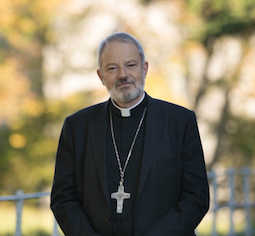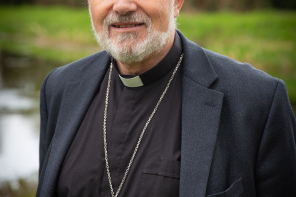Ireland: Homily of Bishop Kevin Doran before Rally For Life

Bishop Kevin Doran
Source: Irish Catholic Media Office
Bishop Kevin Doran, Bishop of Elphin and chairman of the Council for Life of the Irish Catholic Bishops' Conference, gave the following homily during Mass at Saint Saviour's Church, Dominick Street, Dublin, on Saturday 1 July, before the 'Rally for Life'.
Many of you will know something about Saint Oliver Plunkett, whose Feast we celebrate today. You may know that, in the late 17th Century, he returned to Ireland from Rome, to serve as Archbishop of Armagh; that he spent ten years exercising his ministry under difficult circumstances, and that he was arrested and eventually executed in London. The words of the first reading today would be a good description of the faithfulness with which he carried out his mission: "I shall look for the lost one, bring back the stray, bandage the wounded and make the weak strong…. I shall be a true shepherd to them."
As we gather today to celebrate this Mass in advance of the Rally for Life, there are a few things about the life and death of Oliver Plunkett that are particularly relevant. It was not just because he was a Bishop that he was arrested; it was because he acted with integrity and challenged others who did not. His presence was inconvenient for some, including even some priests, and he had to be got rid of. There was no honest way to convict him, so they told lies about him. The principal charge against him was he was involved in the plot to bring in a French army. It suited the English establishment at the time to have a high-profile scapegoat, but it was the Irish who delivered Oliver to the scaffold.
Pregnancy is, quite literally, a life-giving experience and for the majority of parents, thankfully, it is a happy and a hope-filled time. We know, of course, that pregnancy can also be inconvenient for various reasons, especially if it comes about in the absence of a committed relationship. When an unborn child is experienced as "inconvenient", we either adapt in order to welcome it, or we make arrangements to dispose of it. This is where we come face to face with the truth. A society that seeks to justify abortion inevitably finds itself in conflict with the truth.
The first denial, of course, is when we tell ourselves that this is not a human being; not a baby. Some people out there think that our respect for life is just a matter of religion. We need to have confidence that the position we take as people of faith is backed up by scientific fact, and that advances in science make it clearer now than it ever was that this is a human person in the early stages of development. Pope Francis often comments that we need to call things by their proper names. He wrote recently about the important contribution of science in helping us to know exactly what we are dealing with in pregnancy. "I invite everyone around the world to reflect on the reality of abortion not only from the basis of one or another faith or thought tradition, but also with the qualified contribution of science" (Preface to The Miracle of Life, Mondadori, May 2023).
The recent review on the operation of the Termination of Pregnancy Act is a good example of how the truth is often the first victim of abortion. In the first place this was not a review of the Act in itself, but only a review of how it operates. In other words, the Government was not interested in what people thought about abortion. All they wanted was to establish whether the act was effective in what it set out to do, namely ending the lives of unborn babies. It was made clear at the outset that the State had no interest in submissions which would advocate in favour of unborn babies, or indeed in favour of women who are also victims of abortion.
In order to justify the use of public health resources and the pressure on healthcare professionals, such as doctors, nurses and pharmacists to provide abortion, the "Review" consistently refers to abortion as "women's healthcare". In reality, however, as official statistics show, a staggering 98% of all abortions carried out in Ireland take place during the first twelve weeks of pregnancy, when no explanation or reason is required or recorded. There is no evidence whatsoever that those abortions have anything to do with healthcare.
Once again, when it comes to the three-day waiting period, the truth is inconvenient and so it is ignored. The purpose of the three days between the certification by the doctor and the actual abortion, was to provide a window of opportunity for a woman to consider the decision she is about to make and to explore whether she might have other options. According to HSE figures, large numbers of women (27%) do not return after the three days, indicating that over a quarter of women change their minds for one reason or another. The three-day waiting period works, not only to save babies, but to save women from a decision that they may regret for the rest of their lives. The Review published different, lower, figures, coming from a pro-abortion source, and recommends that the three-day waiting period would become purely advisory.
Throughout the Review, the language of concern for women and for women's health is repeated. The reality, however, is that while the legislation is about providing abortion, there is nothing in the legislation that is designed to find out why thirty thousand women sought abortion over the past four years, what were their circumstances physically, economically or emotionally, what other options they might have been given, or what has happened to-them since.
If we return to the Scripture readings which were proclaimed to us this afternoon, one thing that seems crucial is the need for us, in imitation of Jesus, and in imitation of people like Oliver Plunkett, to adopt the role of the shepherd; to be pastoral and to offer genuine human support in our response to the reality of human life in the womb and in our response to women for whom pregnancy is difficult and inconvenient. It is not only by our words, but also by our actions that we will convince people.
In speaking the truth, we need to be courageous, and we also need to be respectful. Words and actions which are aggressive or intolerant do not contribute to building a culture of respect for life. The authentic shepherd always seeks out the one who is lost.
One final word. Oliver Plunkett devoted much of his energy to reconciliation and to the resolution of disputes. It is important that, as people of faith, we are also witnesses of reconciliation and peace.
One of the very beautiful things that is happening in Ireland, unknown to many, is the ministry of healing that is carried out discretely by Rachel's Vineyard through the retreats provided for women (and men) who have been touched by abortion. These retreats bring healing, not by denying the truth of what happened, but by facing that truth honestly in the light of another essential truth, which is the mercy of God who lifts us up when we fall and who, through His great love, opens up the way of peace. This is a ministry that needs all our support.


















